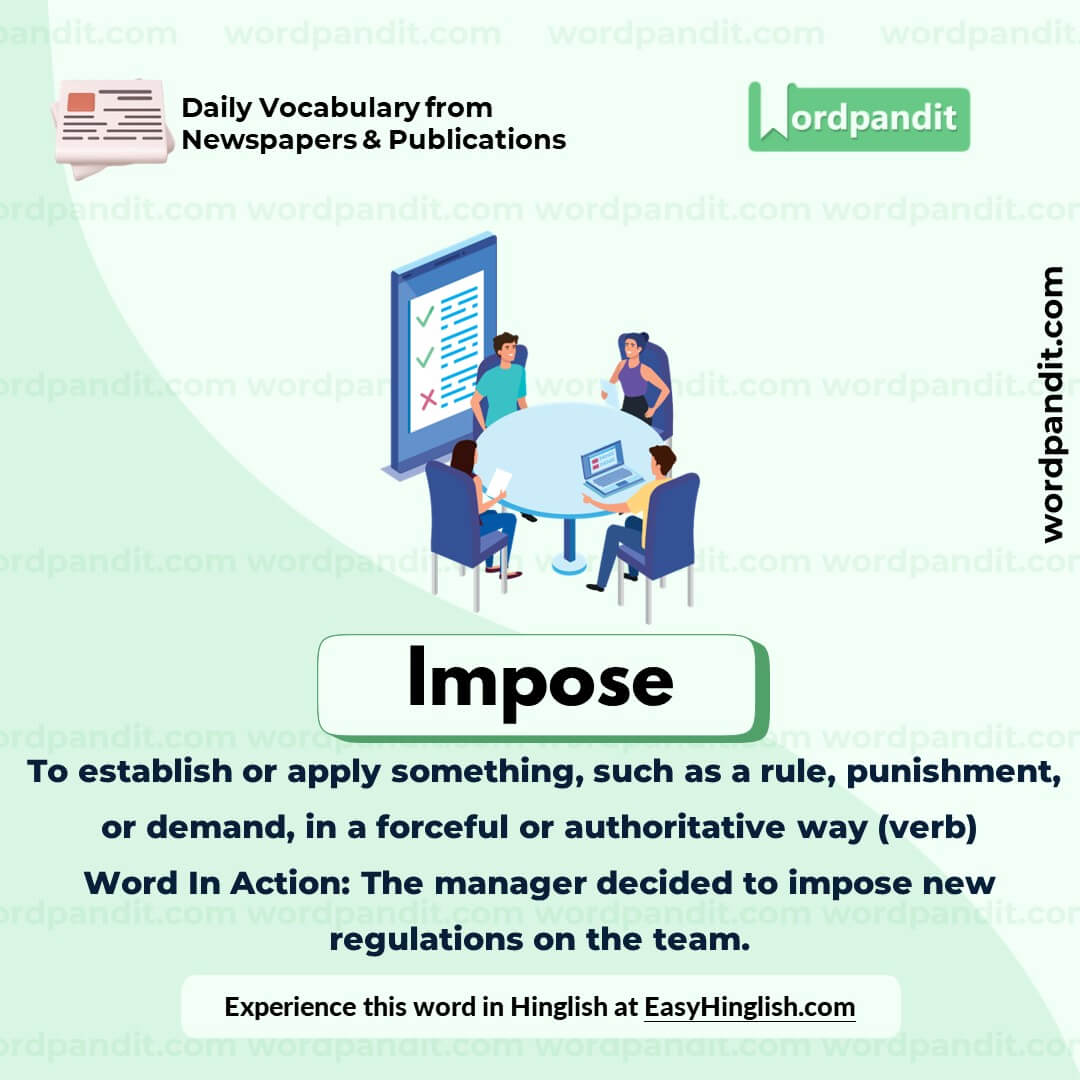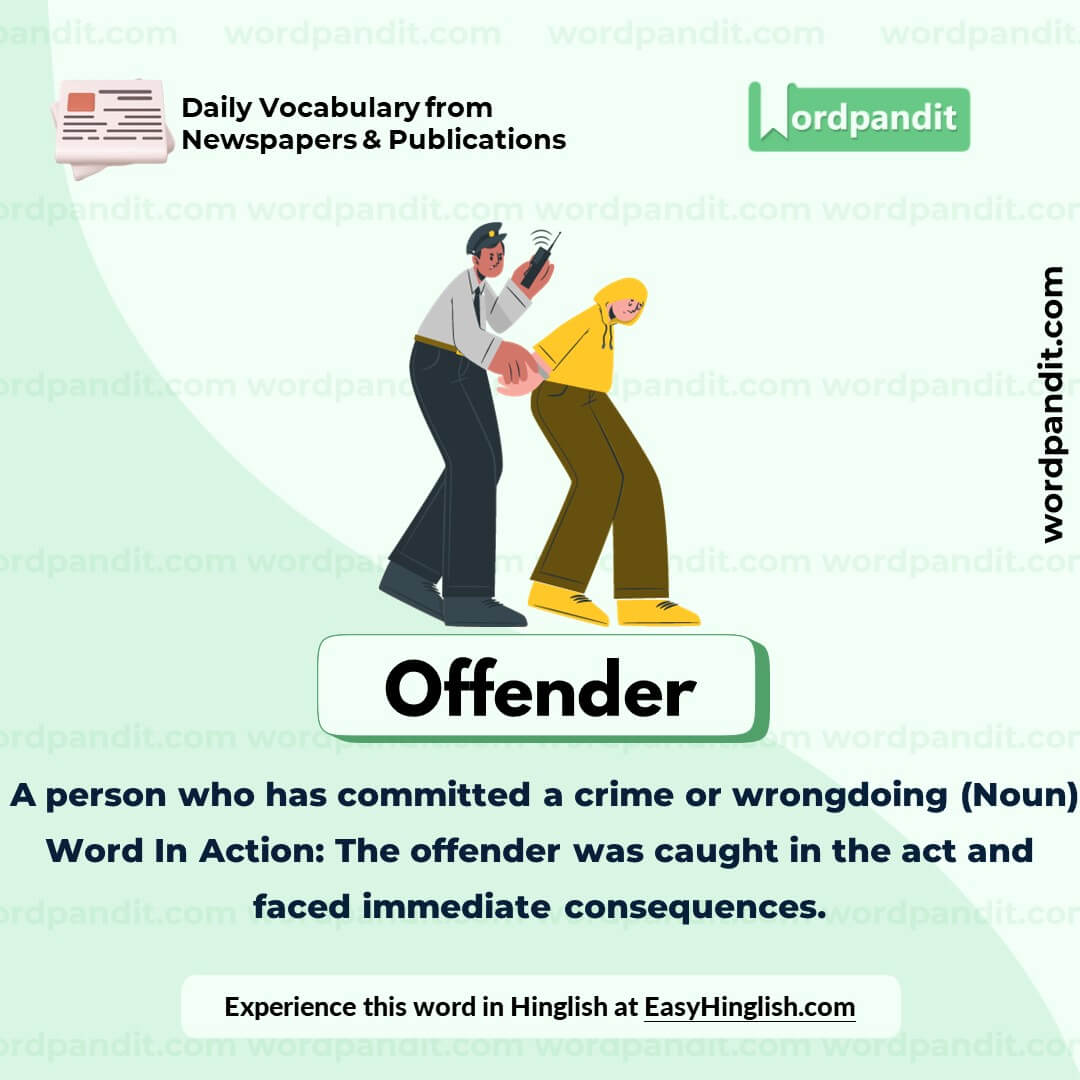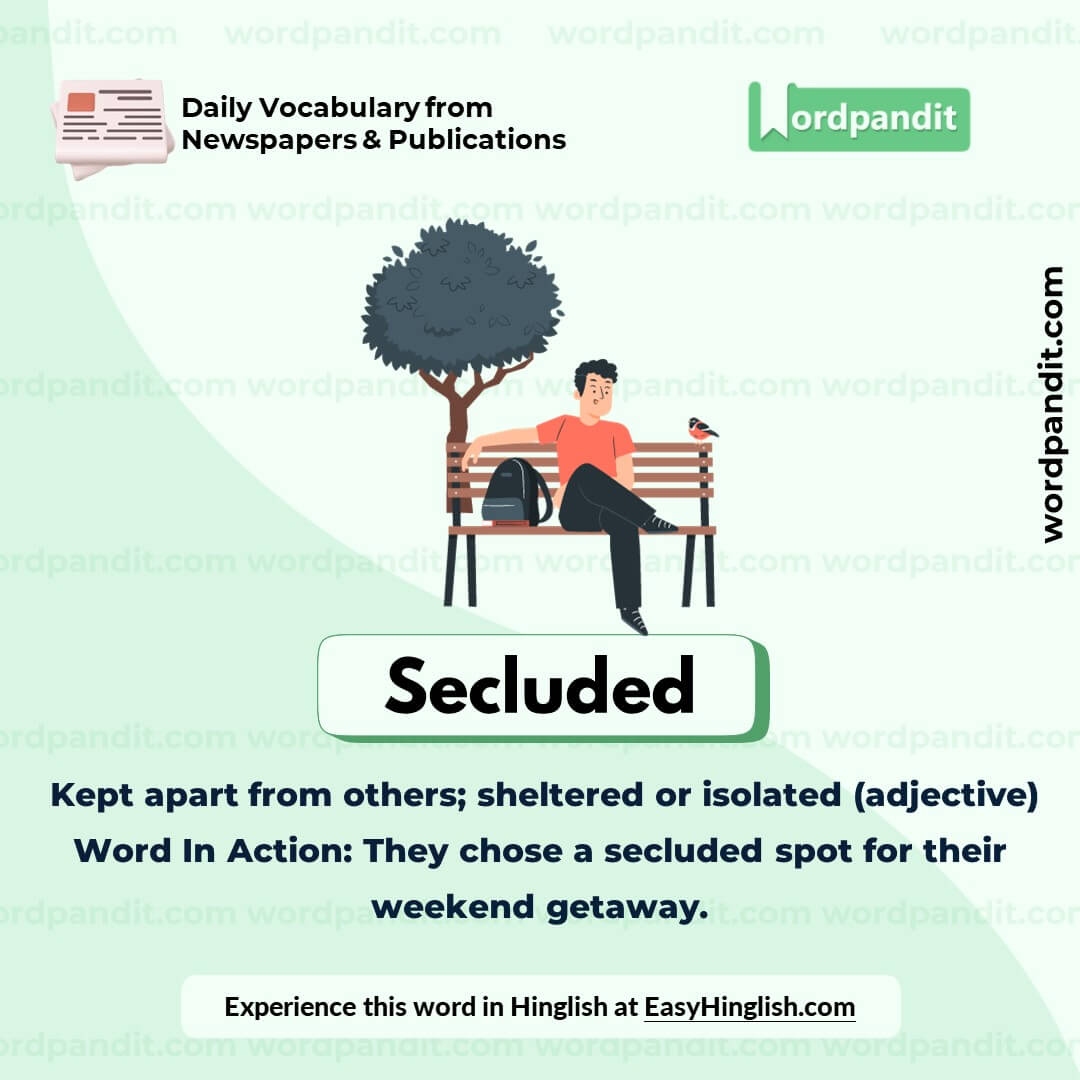Daily Vocabulary from International Newspapers and Publications
Expand Your Vocabulary with Wordpandit’s Global Vocabulary Hub
At Wordpandit, we are committed to helping you develop a truly global vocabulary by drawing from some of the most respected international publications. This section is designed to keep you ahead of the curve by introducing you to words that define global conversations and trends.
The Power of Global Sources
To help you think and communicate on a global scale, we curate vocabulary from renowned international sources, such as:
- The New York Times
- The Washington Post
- BBC
- The Guardian
- The Economist
- Scientific American
- Psychology Today
- And many more...
Stay Global, Stay Competitive
Our daily updates from international publications ensure you are consistently exposed to new words that reflect global news and developments, making sure your vocabulary is not only current but also globally relevant.
Enhance Your Global Perspective
Whether you’re preparing for international exams, aiming to excel in global business communication, or want to enhance your language skills for personal growth, Wordpandit offers the resources you need to thrive in a global context.
Effective Learning, Global Reach
Our learning methodology combines global examples, memory aids, and interactive activities, allowing you to internalize new words effectively and apply them in real-world scenarios.
Begin Your Global Vocabulary Journey Now!
Why Choose Wordpandit?
Practical Learning: Focus on words you'll actually encounter in real-world reading, enhancing your comprehension and communication skills.
Diverse Content: From current affairs to scientific breakthroughs, our varied sources expose you to vocabulary across multiple domains.
Effortless Integration: Make Wordpandit a part of your daily routine. Just a few minutes each day can significantly boost your lexicon over time.
Your Path to Vocabulary Mastery
- Visit our Daily Vocabulary section regularly
- Explore new words and their usage in context
- Practice incorporating these words into your own writing and speech
- Track your progress as your vocabulary expands
Start Your Journey Today
Embark on your vocabulary enhancement journey with Wordpandit. By consistently engaging with our daily posts, you'll build a robust vocabulary that serves you well in academic, professional, and personal contexts.
Remember, a word a day keeps linguistic limitations at bay. Make Wordpandit your daily companion in the quest for vocabulary excellence!
WORD-1: Affirmative
Context:
"While opponents of affirmative action argue that such practices unfairly favour some groups over others, proponents point out that race is just one factor among many in admissions decisions." - Aljazeera
Explanatory Paragraph:
The word "affirmative" typically means expressing agreement or approval. In a broader sense, it can also refer to policies or actions designed to support certain groups, such as affirmative action, which aims to promote equal opportunities for historically disadvantaged groups. It conveys a positive or supportive stance.
Meaning: Expressing agreement or approval; positive in nature (Adjective)
Pronunciation: uh-FUR-muh-tiv
Difficulty Level: ⭐⭐⭐ Intermediate
Etymology: Derived from the Latin word "affirmativus," meaning "asserting" or "confirming."
Synonyms & Antonyms:
Synonyms: Positive, supportive, approving, confirmative
Antonyms: Negative, disapproving, dissenting
Usage Examples:
- The committee gave an affirmative response to the proposed changes.
- Affirmative action policies aim to create a more inclusive workplace.
- The officer replied in the affirmative when asked if the mission was a success.
- She gave an affirmative nod, signaling her approval of the idea.
Cultural Reference:
"Affirmative action has been a significant policy tool in addressing historical inequalities and fostering diversity in institutions worldwide." - Aljazeera
Think About It:
How can affirmative action balance fairness for all individuals while addressing systemic inequalities?
Quick Activity:
Create a sentence using "affirmative" in the context of a positive response to a challenging situation.
Memory Tip:
Think of "affirmative" as affirming or saying "yes" to something positive—just like affirmations you use to build confidence!
Real-World Application:
The word "affirmative" is commonly used in formal responses, policy discussions, and initiatives such as affirmative action that aim to ensure equality and inclusion.
WORD-2: Impose
Context:
"Justice is served when proportionate suffering is imposed on the offender, which essentially takes the form of exclusion from society." - Psyche
Explanatory Paragraph:
The word "impose" refers to the act of placing a rule, punishment, or demand on someone or something, often in a way that is authoritative or compulsory. It implies the application of authority or force to ensure compliance or adherence.
Meaning: To establish or apply something, such as a rule, punishment, or demand, in a forceful or authoritative way (verb).
Pronunciation: im-POHZ
Difficulty Level: ⭐⭐ Beginner
Etymology: Derived from Latin "imponere," meaning "to place upon," from "in-" (on, into) + "ponere" (to place).
Synonyms & Antonyms:
Synonyms: enforce, apply, institute, levy
Antonyms: remove, withdraw, abolish
Usage Examples:
- The government decided to impose a curfew in the city to maintain order.
- Parents often impose strict rules on their children to ensure discipline.
- The teacher imposed additional homework as a penalty for late submissions.
- It is unfair to impose one's beliefs on others without their consent.
Cultural Reference:
"In ancient societies, rulers would impose heavy taxes on their subjects to fund wars and palaces." - Historical Context
Think About It:
Is it always ethical for authorities to impose laws or restrictions? When might imposing rules cross the line into oppression?
Quick Activity:
Write a sentence using "impose" in the context of education or governance. Share it with a peer for feedback.
Memory Tip:
Think of "impose" as "I’m placing something on you"—like a rule or a demand.
Real-World Application:
The word "impose" is often used in discussions about law, policy-making, and interpersonal relationships, particularly when describing situations where authority or control is exerted.
WORD-3: Offender
Context:
"Justice is served when proportionate suffering is imposed on the offender, which essentially takes the form of exclusion from society." - Psyche
Explanatory Paragraph:
The term "offender" refers to a person who has committed a crime, violated a law, or caused harm to others. The word is often used in legal, societal, and ethical contexts to describe someone who has breached societal norms or rules, necessitating corrective or punitive measures.
Meaning: A person who has committed a crime or wrongdoing. (Noun)
Pronunciation: uh-FEN-der
Difficulty Level: ⭐⭐ Beginner
Etymology: Derived from the Latin word "offendere," meaning "to strike against or displease," it entered Middle English through Old French.
Synonyms & Antonyms:
Synonyms: Wrongdoer, culprit, transgressor, violator
Antonyms: Law-abider, innocent, victim, conformer
Usage Examples:
- The offender was apprehended by the police shortly after the theft.
- Programs for the rehabilitation of offenders are gaining popularity in modern justice systems.
- An offender who repeatedly breaks the law may face more severe consequences.
- Community service is often used as a penalty for minor offenders.
Cultural Reference:
"In many justice systems worldwide, the term 'offender' signifies not just legal accountability but also the potential for rehabilitation and reintegration into society." - Legal Studies Perspective
Think About It:
Should society prioritize the punishment or rehabilitation of offenders, and how can these approaches coexist?
Quick Activity:
List three actions that could classify someone as an "offender" and brainstorm alternative ways to address these offenses other than punishment.
Memory Tip:
Remember "offender" by linking it to the word "offense," as both share the idea of breaching a rule or norm.
Real-World Application:
The term "offender" is commonly used in law enforcement and judicial contexts but is also applicable in schools, workplaces, or communities to describe someone who violates rules or expectations.
WORD-4: Secluded
Context:
"Prison is not just a place where offenders are secluded to keep society safe; it also carries the symbolic meaning of deserved social rejection." - Psyche
Explanatory Paragraph:
The word "secluded" describes a state of being isolated, removed, or set apart from others. It often implies privacy, tranquility, or deliberate separation from the larger world, whether for safety, security, or personal reasons.
Meaning: Kept apart from others; sheltered or isolated (adjective).
Pronunciation: sih-KLOO-did
Difficulty Level: ⭐⭐ Beginner
Etymology: Derived from Latin "secludere," meaning "to shut off," from "se-" (apart) + "claudere" (to close).
Synonyms & Antonyms:
Synonyms: isolated, remote, private, hidden
Antonyms: public, open, accessible, exposed
Usage Examples:
- The writer rented a secluded cabin in the woods to work on her novel.
- During the pandemic, many people sought secluded spots for safe vacations.
- The monastery was built in a secluded valley, far from urban life.
- The children played in a secluded corner of the park, away from the crowd.
Cultural Reference:
"Famous artists like Vincent van Gogh often worked in secluded environments to find inspiration." - Art History Insight
Think About It:
Does being secluded always lead to peace and productivity, or can it also result in loneliness and disconnection?
Quick Activity:
Think of a place you would consider secluded. Write a short paragraph describing it and why it feels secluded to you.
Memory Tip:
Remember "secluded" by thinking of a "secret location"—a place that is tucked away from others.
Real-World Application:
The concept of "secluded" is used in various contexts, such as describing vacation destinations, places for meditation, or secure facilities like prisons, emphasizing either privacy or isolation.
WORD-5: Clogged
Context:
"In 2004, aged 58, he had a quadruple bypass surgery after doctors found signs of extensive heart disease and, ten years later, he had a clogged artery opened after complaining of chest pains." - BBC
Explanatory Paragraph:
The word "clogged" refers to something that is blocked or obstructed, preventing the normal flow of substances such as liquids, air, or traffic. In the given context, it describes a medical condition where an artery is blocked, restricting blood flow and causing health complications.
Meaning: Blocked or obstructed, often causing difficulty in flow (Adjective)
Pronunciation: klawgd
Difficulty Level: ⭐⭐ Basic
Etymology: Derived from the Middle English word "clogge," which originally referred to a block of wood or obstruction, later evolving to describe blockages in general.
Synonyms & Antonyms:
Synonyms: Blocked, obstructed, jammed, choked
Antonyms: Clear, unblocked, open, free-flowing
Usage Examples:
- The sink was clogged, so the water couldn’t drain properly.
- Traffic was clogged on the highway due to an accident.
- Her mind felt clogged with too many thoughts and decisions to make.
- He had to take medicine to treat his clogged nasal passages during the cold.
Cultural Reference:
"Clogged arteries" are often cited in public health campaigns to raise awareness about the dangers of high cholesterol and unhealthy eating habits. Such campaigns emphasize prevention through a healthy lifestyle. - Public Health Outreach
Think About It:
How might modern lifestyles contribute to the literal and metaphorical clogging in our daily lives, and what steps can we take to clear these blockages?
Quick Activity:
List three scenarios where something might get "clogged" (literal or metaphorical) and describe how you would solve the problem.
Memory Tip:
Think of a "clogged drain" at home—when something is stuck, flow stops. This image helps you remember that "clogged" means blocked or obstructed.
Real-World Application:
The term "clogged" is commonly used in various fields, including medicine (clogged arteries), engineering (clogged pipes), and daily life (clogged roads), making it a versatile and practical word to know.
















